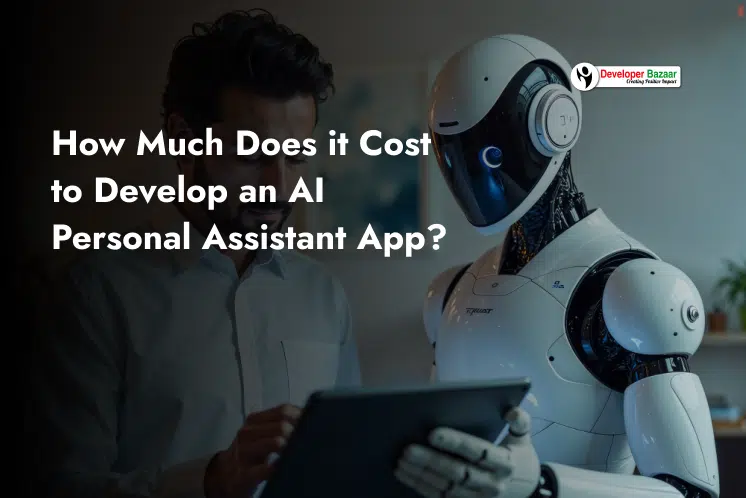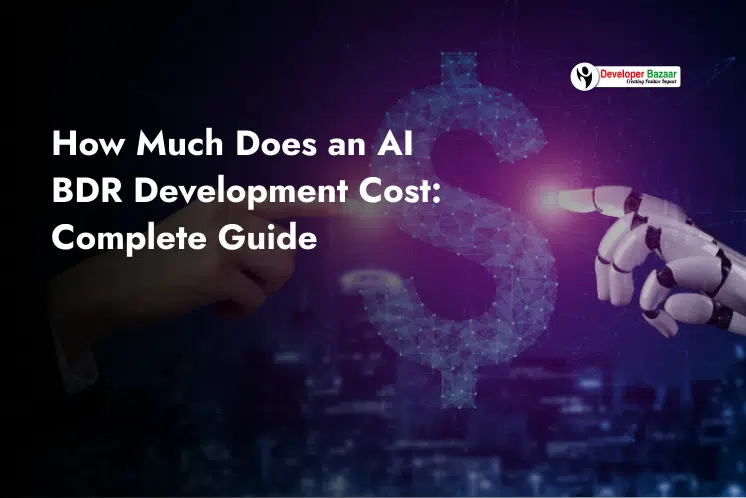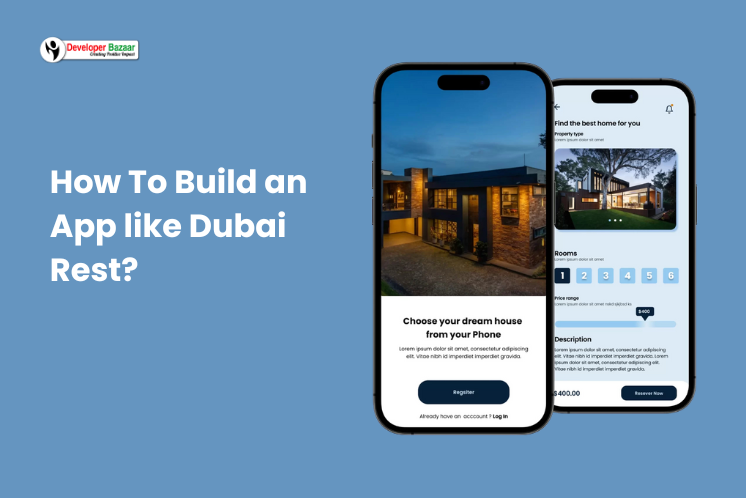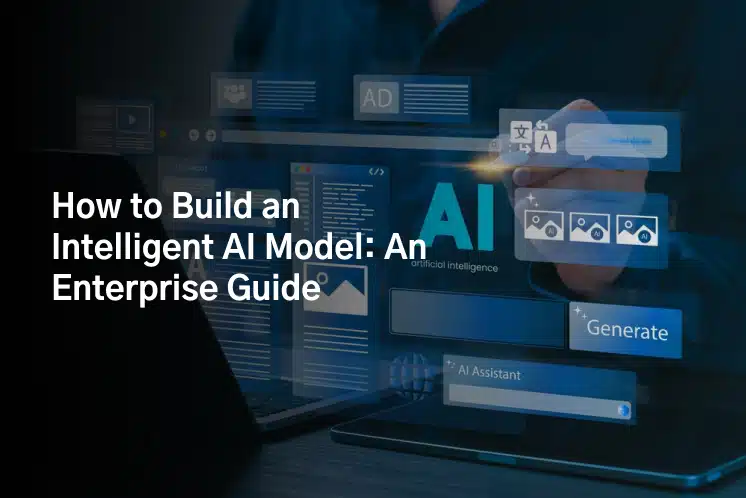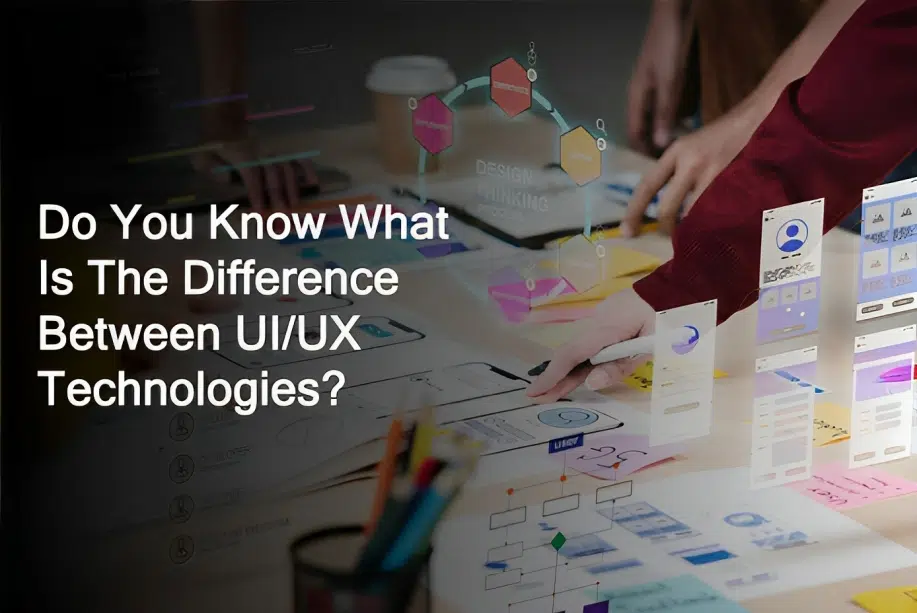Table of Contents
ToggleHave you ever said, “Hey Google, what’s the weather today?” or asked Siri to remind you about tomorrow’s meeting? If yes, then congratulations, you’ve already used an AI-powered smart personal assistant app!
These intelligent apps are not only named cool tech tools but they’re a part of our everyday life.
From checking the news to playing your favorite song or booking a ride, AI personal assistants are making things easier than ever.
In this article, we’ll explore what these apps are, how popular they’ve become, the features that make them so useful, and most importantly, how much it really costs to develop an AI personal assistant app like Siri, Alexa, or Google Assistant.
What are AI-Enabled Smart Personal Assistant Apps?
AI-enabled smart personal assistant apps are like your tiny digital helpers. You can talk to them, and they respond almost like a human. Whether you want to check weather, set an alarm, or send a message, these apps can do it for you with just one voice command.
Siri, Google Assistant, and Alexa are good examples of these apps. These apps use smart technologies like:
- NLP (Natural Language Processing) - to understand your words
- LLM (Large Language Models) - to give smart, human-like answers
- Machine Learning (ML) - to learn your habits and get better over time
So, when you build an AI personal assistant app, you’re actually developing a helpful buddy that makes work easier for your users.
AI-Enabled Smart Personal Assistant Apps: Market Overview
AI assistants aren’t just popular, they’re booming in the market. The numbers say it all:
- According to GlobeNewsWire The global AI personal assistant app market is expected to hit $83.66 billion by 2030.
- It’s growing at a super-fast pace of 34.13% every year from 2020 to 2030.
- The biggest reason? Every day, more people are starting to use smartphones!
That’s why so many startups and businesses are now reaching out to an AI app development company or mobile app development company to build their own assistant app.
Some Essential Features of AI Assistant App
When you’re planning to develop an AI personal assistant app, it’s important to get enough idea about the features that actually need to be added in your application.
Below are some must-have features that improve user experience and also play a huge role in deciding the AI personal assistant app development cost.
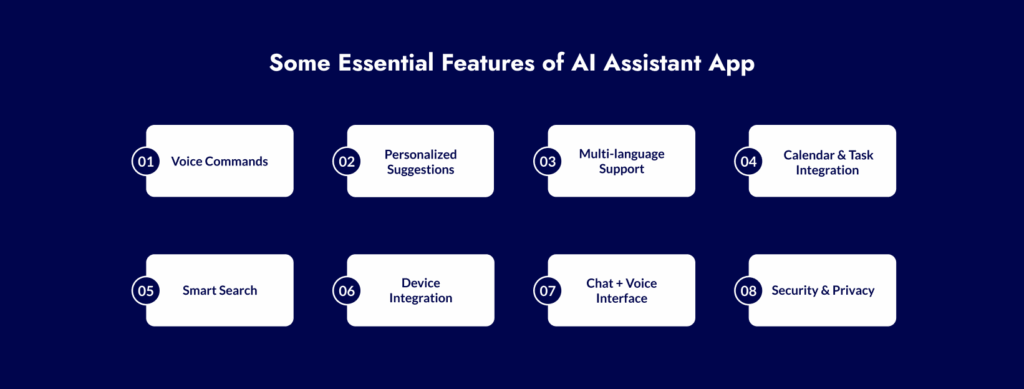
1. Voice Commands
Voice control is the most crucial thing of every AI assistant app. It allows users to perform actions like sending messages, setting reminders, or playing music simply by speaking. This makes the app super easy to use, especially when users are busy or can’t touch their phones.
2. Personalized Suggestions
Smart assistants should feel “personal.” With the help of AI, the app can learn user habits and preferences to offer relevant tips, reminders, or content. For example, if someone always listens to soft music at night, the app can automatically suggest a playlist at bedtime.
3. Multi-language Support
Your users might come from different parts of the world. Adding support for multiple languages makes your app more user-friendly and helps you reach a global audience. This boosts your app’s popularity and engagement across regions.
4. Calendar & Task Integration
Let users connect their calendars and task apps so they can stay organized. The assistant can remind them of important meetings, birthdays, or deadlines. This feature is perfect for people who need a little extra help managing their day.
5. Smart Search
An AI assistant should be like a walking (or talking) encyclopedia. With smart search, users can quickly ask questions like “What’s the capital of Japan?” or “Find nearby pizza places” and get accurate answers in seconds.
6. Device Integration
People use more than just smartphones these days. Your AI assistant should work smoothly with smartwatches, fitness bands, or smart home devices. That way, users can control lights, check fitness stats, or play music across devices, all using your app.
7. Chat + Voice Interface
Not everyone wants to speak on their phone in public. So, offer both voice and text-based options. Let users type or talk, whichever they’re more comfortable with. It makes the app more flexible and accessible.
8. Security & Privacy
AI apps often handle sensitive data like personal schedules and voice recordings. To build trust, your app must have strong security features like end-to-end encryption, data protection policies, and clear privacy settings. This keeps user info safe and private.
These smart features make your app more useful and lovable, but remember, they also affect the overall AI app development cost.
To get everything done right, it’s always a good idea to work with an experienced AI app development company or a trusted mobile app development company.
How can you build an AI-powered intelligent personal assistant mobile app?
Before beginning to develop an AI personal assistant app, you must be aware of the basic but major steps to follow.
Each step plays a key role in shaping your app’s performance and cost.
1. Define Your App's Purpose and Target Audience
First, think about what your AI assistant should do. Should it help users schedule tasks, manage emails, or act like a smart chatbot?
Knowing your app’s main goal and audience will guide every other decision, features, platform, and even the total AI personal assistant app development cost.
2. Choose the Right Technology Stack
To build a smart and responsive assistant, you need the right tech tools. This usually includes AI/ML frameworks, natural language processing (NLP) libraries, cloud platforms (like AWS or Google Cloud), and mobile app frameworks. The better the tools, the smoother the performance, but it can also affect your AI app development cost.
3. Create a User-Friendly UI/UX Design
Your app should be super easy to use. Users should know where to tap, speak, or type without getting confused. A clean and simple design improves the user experience and keeps people coming back. Good design might add to the AI app development cost a bit, but it’s totally worth it.
4. Integrate Core AI Features
Now it’s time to make your assistant work. Add features like voice recognition, chat functionality, reminders, and calendar syncing. You can also use APIs like Google Assistant or SiriKit to speed things up. If you add more advanced features, the AI personal assistant app development cost will go up.
5. Train the AI with NLP and Machine Learning
This step helps your app understand voice commands and natural language. You’ll need to train the AI model using real data so it becomes smarter over time. This phase can take time and affects both the timeline and cost to develop an AI personal assistant app.
6. Test the App Thoroughly
Before you launch, test everything, from voice commands to chatbot responses. Fix bugs and make sure the app runs well across devices. This helps avoid user complaints and ensures your app works like a pro from Day 1.
7. Launch and Gather Feedback
Once your app is live, ask users for feedback. Find out what they like and what needs to be better. Based on this, you can plan new features or updates. This user feedback also helps you plan smart upgrades without overspending on AI app development cost.
How Much Does It Cost to Develop an AI Personal Assistant App?
The cost to develop an AI personal assistant app depends on many things, like what features you want, which platform you’re building it for (iOS, Android, or web), and who you hire to build it.
On average, the AI personal assistant app development cost can range from $20,000 to $60,000. If you want to add advanced features like voice recognition, real-time answers, or smart suggestions, the cost can go even higher, sometimes up to $100,000 or more.
Also, remember: the price you pay to build the app is just the start. You’ll also need to spend money on updates, bug fixes, and improvements after the app is launched.
If you’re not sure how much your specific project will cost, it’s best to contact a mobile app development company and ask for a custom quote.
What Factors Affect the Cost to Build an AI Personal Assistant App?
There’s no fixed price for AI app development. The AI personal assistant app development cost changes based on a few important things:
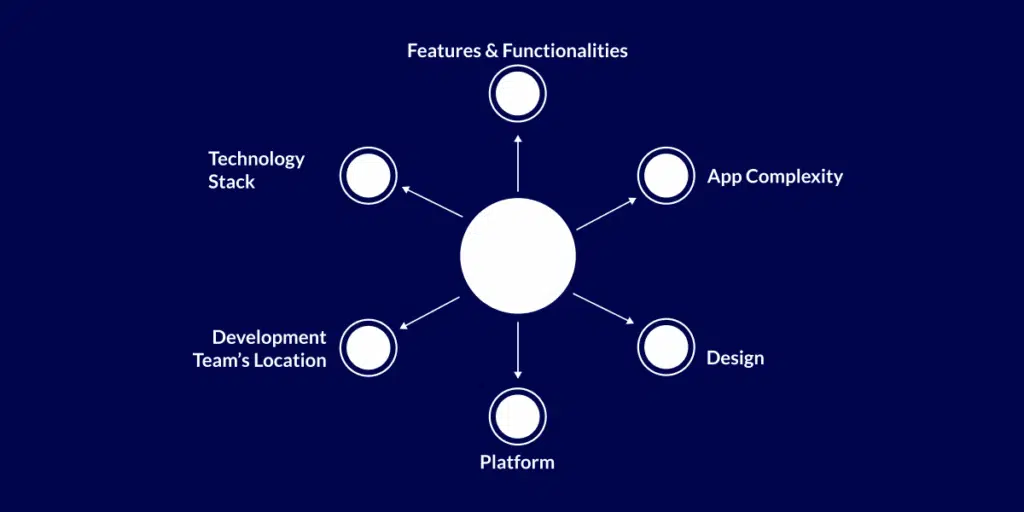
1. Features & Functionalities
The more features you want, the more it’ll cost. A basic app will be cheaper, while an advanced app with voice commands, reminders, and custom responses will cost more.
2. App Complexity
An app like Siri or Alexa is complex and needs more time, tools, and people to build, which increases the cost.
3. Design
A fancy design with cool graphics and animations costs more than a simple, clean design. But a better design can also lead to a better user experience.
4. Platform
5. Development Team’s Location
Where your developers are located matters. For example, If you hire a team of experts, they will help you guide the cost estimation for AI app development cost so you can customize the cost based on your expected features without compromising on quality.
6. Technology Stack
The tools, languages, and frameworks used to build the app also affect the price. Using open-source tools like Python andf TensorFlow can reduce the cost.
So, before you begin, make a list of what you want in the app and discuss it with a trusted AI app development company to get a proper cost estimate.
Key Benefits of AI-Powered Personal Assistants App
Thinking about whether you should build an AI personal assistant app for your business? These apps are becoming popular for a reason.
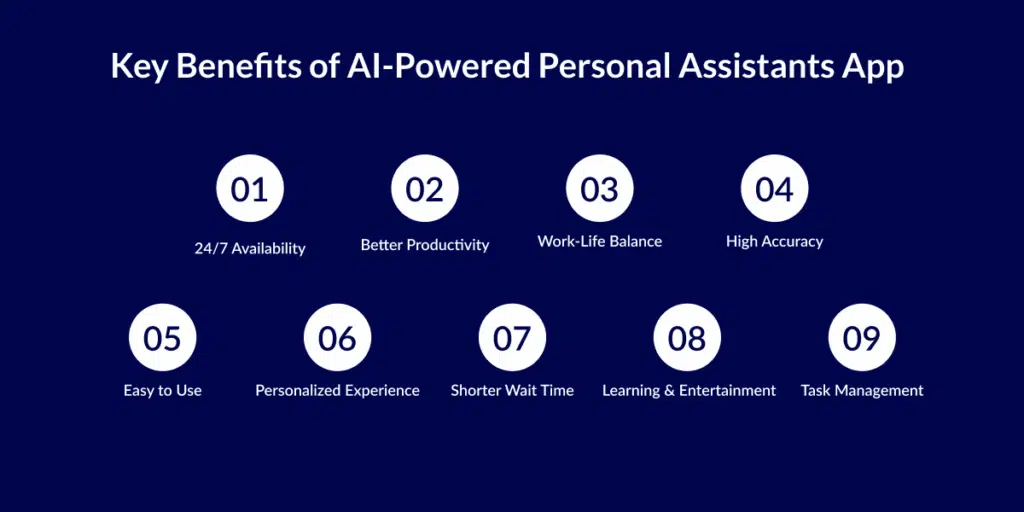
1. 24/7 Availability
AI assistants never sleep or take a day off. They are available all day, every day, to help users whether it’s early morning or late at night. This is great for businesses that serve people in different time zones or need to offer round-the-clock support.
2. Better Productivity
AI assistants can handle routine tasks like checking schedules, replying to simple questions, or setting reminders. This frees up time for your team to work on more important or creative things, which boosts overall productivity.
3. Work-Life Balance
By managing small daily tasks, AI assistants help reduce stress and workload. Employees or users get more time for their personal lives, to rest, relax, spend time with loved ones, or just recharge after a busy day.
4. High Accuracy
AI apps use technologies like machine learning and natural language processing (NLP) to understand what users say or type. They respond with the right answers or actions, which means fewer mistakes and a smoother experience.
5. Easy to Use
All you need is a smartphone or any device with internet access to talk to your AI assistant. Whether it’s through text or voice, using the app is simple and convenient — no technical skills needed!
6. Personalized Experience
Over time, AI assistants learn about a user’s likes, dislikes, habits, and daily routine. Based on this, they can give personalized suggestions like when to take a break, what song to play, or even what products to recommend.
7. Shorter Wait Time
When users contact customer support, AI assistants can collect basic details like their name, issue, or account info. This helps human agents solve problems faster because they already have the important info upfront.
8. Learning and Entertainment
AI personal assistants can do much more than just help with tasks. They can tell you the latest news, play your favorite music, read audiobooks, or even share motivational quotes. They can also help you learn new things, like facts, language tips, or educational content.
9. Task Management
These apps can be your digital helper for everyday things. Whether it’s creating a shopping list, sending an email, setting up an appointment, or controlling smart devices like lights or AC, the assistant can handle it all with just a voice command or a few taps.
In brief, when you develop an AI personal assistant app, you’re not just building a tool, you’re giving users a smart partner that can save time, reduce effort, and make life easier. Whether it’s for business or personal use, these apps offer real value.
Topmost AI- powered Smart Assistant App in the Market
Here are three of the most popular AI personal assistants that are already making life easier for millions:

1. Apple Siri
Siri was one of the first smart assistants, built right into Apple devices like iPhones and Apple Watches. With 600+ voice commands, Siri can set reminders, make calls, send texts, and more.
App Rating: 4.5/5
2. Amazon Alexa
Alexa is known for its smart home skills. From playing music to ordering groceries, Alexa can do it all. It’s available on Android, iOS, and Amazon Echo devices.
Downloads: 100M+
App Rating: 4.4/5
3. Google Assistant
This is the go-to personal assistant for Android users. Just say “Ok Google” to make calls, find restaurants, control smart devices, and more. It also supports many languages.
Downloads: 1B+
App Rating: 4.1/5
Future Trends in Personal Assistant Chatbots
If you’re planning to develop AI personal assistant app today, here’s what the future looks like:
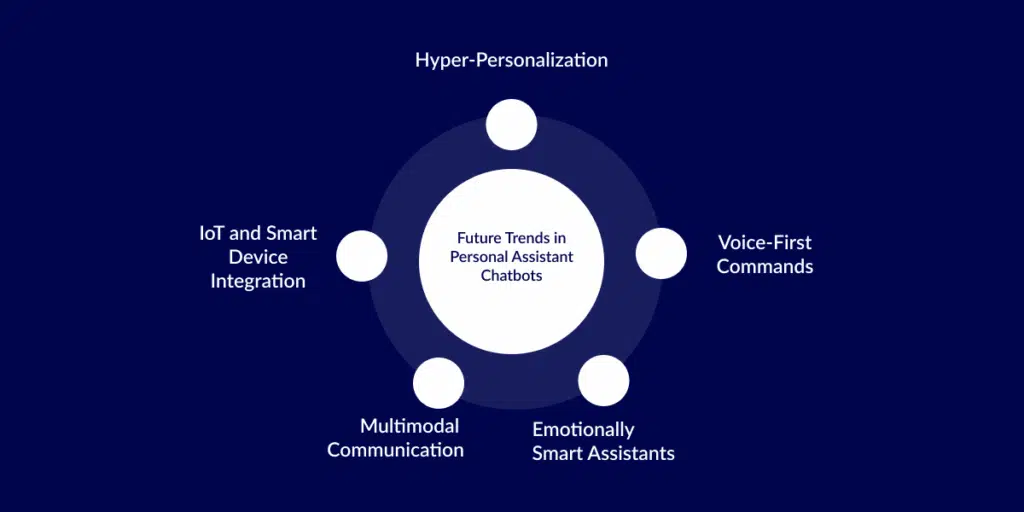
1. Hyper-Personalization
Future AI assistants will remember your habits—like what time you usually work out or how you prefer your emails written. This will make interactions feel more personal and helpful.
2. Voice-First Commands
Voice is becoming the new typing. More people prefer speaking to their assistant than typing. So, adding voice features is a must and might slightly increase your AI app development cost.
3. Emotionally Smart Assistants
Some AI assistants are learning to understand human emotions. If you’re sad or stressed, they’ll respond in a comforting tone. This makes the experience feel more natural and human.
4. Multimodal Communication
Soon, assistants will understand voice, text, images, and even video. Imagine uploading a photo of your prescription and the assistant booking a doctor’s appointment instantly.
5. IoT and Smart Device Integration
AI assistants will soon control every smart device you own, like your AC, car, or coffee maker. This makes them true “life managers” rather than just “voice bots.”
Develop a Virtual Assistant App with Developer Bazaar Technologies.
If you’re serious about building your own AI personal assistant app, partnering with a skilled AI app development company is your best move.
At Developer Bazaar Technologies, we specialize in crafting advanced virtual assistant apps tailored to your needs. Whether you’re a startup or a big enterprise, we can help you build an AI personal assistant app that is powerful, secure, and future-ready.
Our team uses cutting-edge technologies like AI, ML, NLP, and automation to develop apps that are both smart and scalable. We don’t just focus on the features, we focus on building user-friendly assistants that people actually enjoy using.
Discover the real AI personal assistant app development cost for your project. We offer transparent pricing, full-cycle development, and post-launch support.
Conclusion
So, how much does it really cost to develop an AI personal assistant app? Well, the cost depends on your app’s features, complexity, and the development company you choose.
But one thing’s for sure, building a smart assistant today is a smart move for tomorrow. Whether it’s for personal use or business automation, AI personal assistant apps are the future. And with the right strategy and team, you can build one without burning a hole in your pocket.
FAQs
Q1. What is an AI-powered personal assistant app?
A: It’s a mobile or web app that uses artificial intelligence to perform tasks for users—like setting reminders, sending messages, or answering questions—just by voice or text commands.
Q2. What are the most popular AI personal assistant apps today?
A: The top three are Apple Siri, Amazon Alexa, Google Assistant
Q3. What factors affect the AI personal assistant app development cost?
A: The cost depends on,
- Features and complexity
- Platform (iOS, Android, or both)
- UI/UX design
- Development team’s experience
- Tech stack used
- App maintenance and updates

RM Mishra
Co-Founder
Developer Bazaar technologies
